2023 Pitt Sustainability Literacy & Culture Survey Results & Takeaways
The Pitt Sustainability Literacy & Culture Survey assesses the sustainability knowledge, practices, opinions, and preferences of University of Pittsburgh students, faculty, and staff. Given every 3 years, survey results are used by the Pitt Sustainability team to evaluate and evolve current and future sustainability offerings.
Background
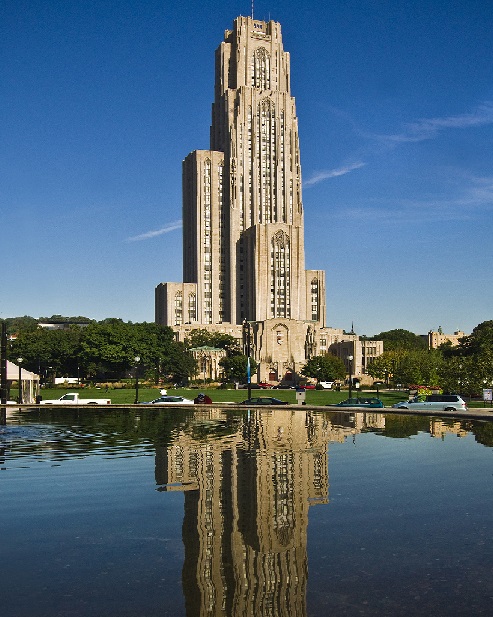
In Spring 2023, Pitt’s Office of Sustainability administered the third Pitt Sustainability Literacy & Culture Survey. Administered triennially, survey findings provide valuable insights on the sustainability literacy and culture within the Pitt community — and comparisons to past 2017 and 2020 surveys provide important context regarding changes over time.
The survey also satisfies 2 credits for AASHE STARS (Sustainability Tracking, Assessment & Rating System):
The University of Pittsburgh’s 2021 AASHE STARS rating is Gold, upgrading from our 2018 Bronze designation.
The 2023 Pitt Sustainability Literacy & Culture Survey had 4 sections:
- Demographics – Pitt affiliation, school, department, major, etc.
- Literacy
- 14 multiple choice questions, each with 1 correct answer
- 1 question asking about familiarity with different sustainability conceepts
- Culture – 12 questions relating to respondent sustainability practices, opinions, and preferences (with no correct answers), including:
- Ideas – 1 open ended question provided respondents with the opportunity to submit feedback and ideas regarding campus sustainability initiatives.
Demographics
Following the timeline of prior surveys, the survey was advertised and open to all members of the Pitt community in Spring 2023. In total, 1,077 respondents took the survey from all 5 University of Pittsburgh campuses (Pittsburgh, Bradford, Greensburg, Johnstown, and Titusville), providing a wide range of perspectives.
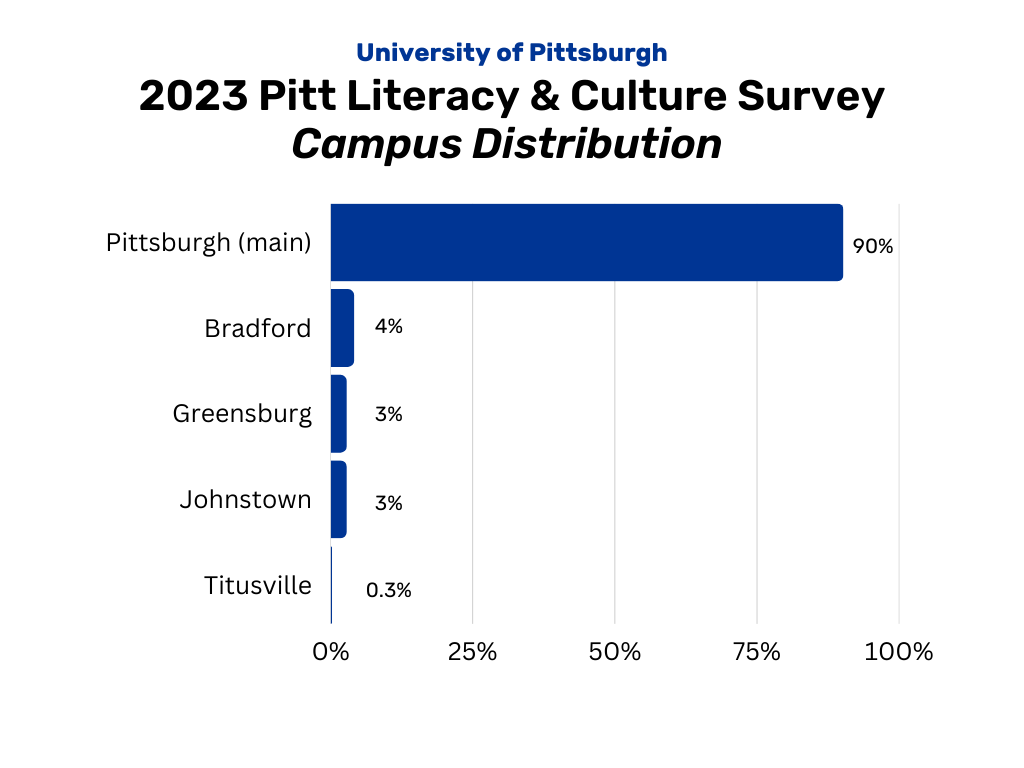
Participation rates varied across campuses and among different groups within the University of Pittsburgh community. Staff members represented the largest percentage of survey takers, with 58% of all responses. Students and faculty participation rates were low by comparison, as illustrated below..
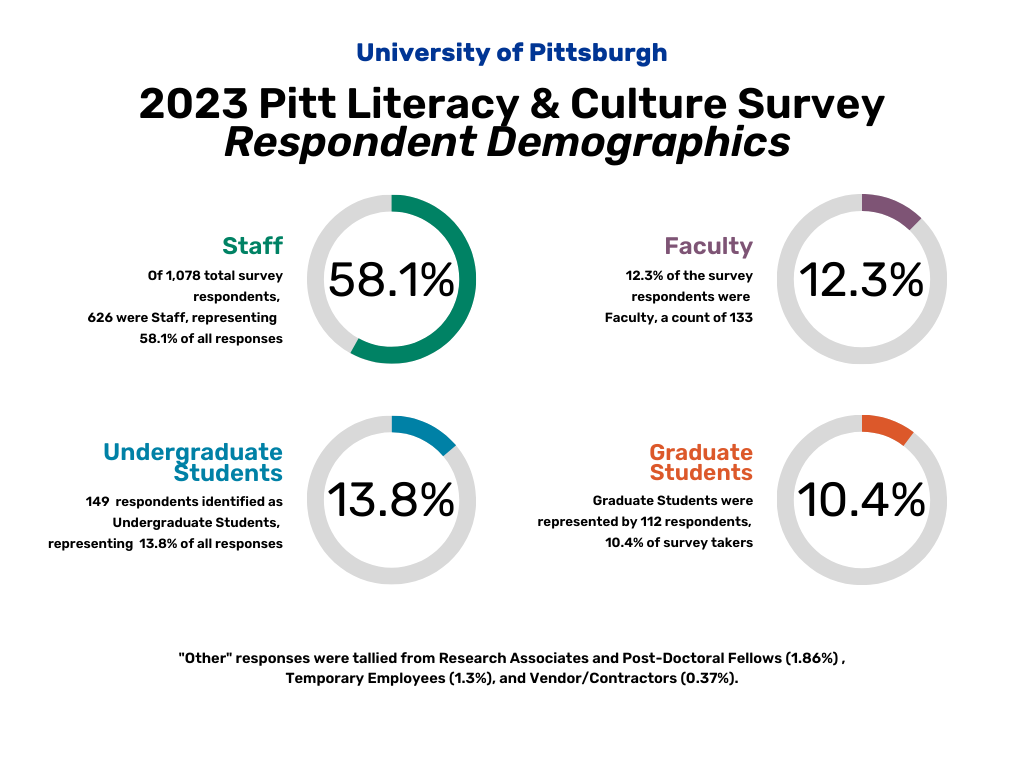
2023 Sustainability Literacy Scores & Insights
In the literacy portion of the 2023 survey, participants answered 14 multiple choice questions (each with 1 correct answer). Selected to gauge understanding of various sustainability concepts, the questions covered a wide range of topics, including the scope of sustainability, climate change, ecosystems, green buildings, the triple bottom line, wealth and poverty, and the Sustainable Development Goals.
Results indicate a diverse range of sustainability literacy levels among Pitt community respondents, with only 26% of respondents achieving scores of 71% or greater and 31% of respondents getting less than 51% of the 14 questions correct.
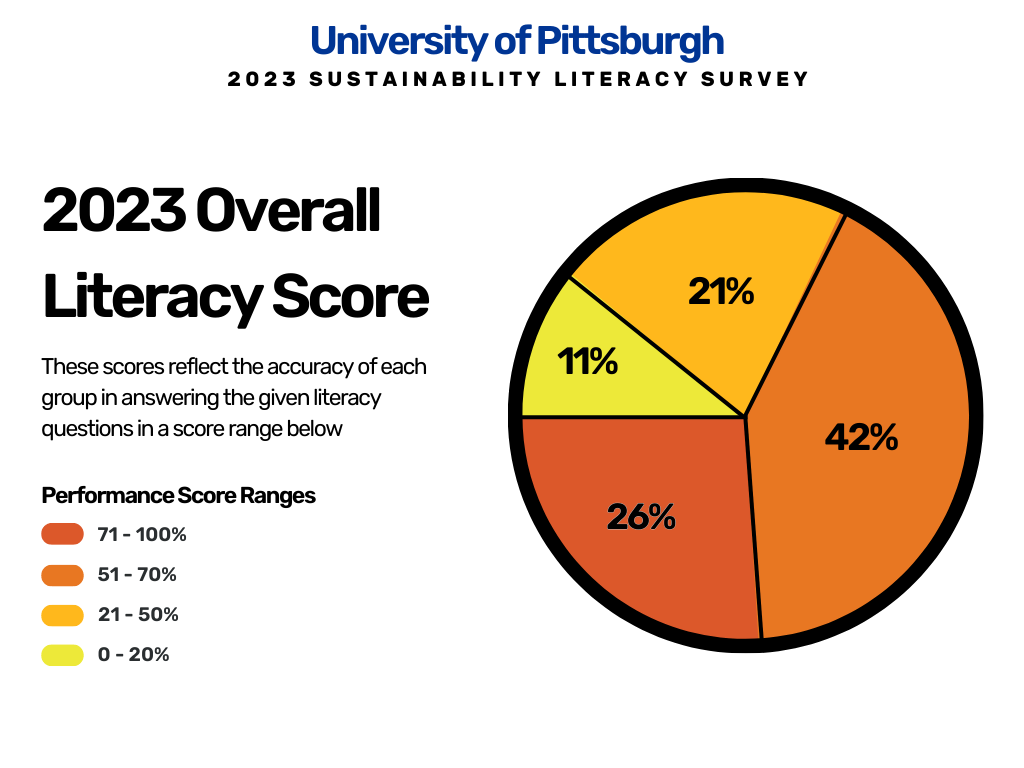
With 11% of respondents getting only 1 or 2 questions correct, there is clear room for improvement in further educating the Pitt community about foundational sustainability concepts. This specfic response set could also indicate that some respondents rushed through the literacy section to get to the more popular culture questions in the survey.
Sustainable Concept Proficiency
One question in the 2023 Pitt Sustainability Literacy & Culture Survey asked participants to indicate their level of knowledge and familiarity with various sustainability concepts (from Novice to Expert).
Results summarized below demonstrate that more general and common terms seem to be better understood (i.e., climate change, environmental justice, globalization, and sustainability). The Pitt community has less general confidence about their knowledge in concepts that tend to be more domain and/or economically specific (i.e., circular economy, externalities, and triple bottom line). Knowledge about the Sustainable Development Goals seems to have increased from 2020 results, but almost 50% of respondents consider themselves a novice on these global goals.
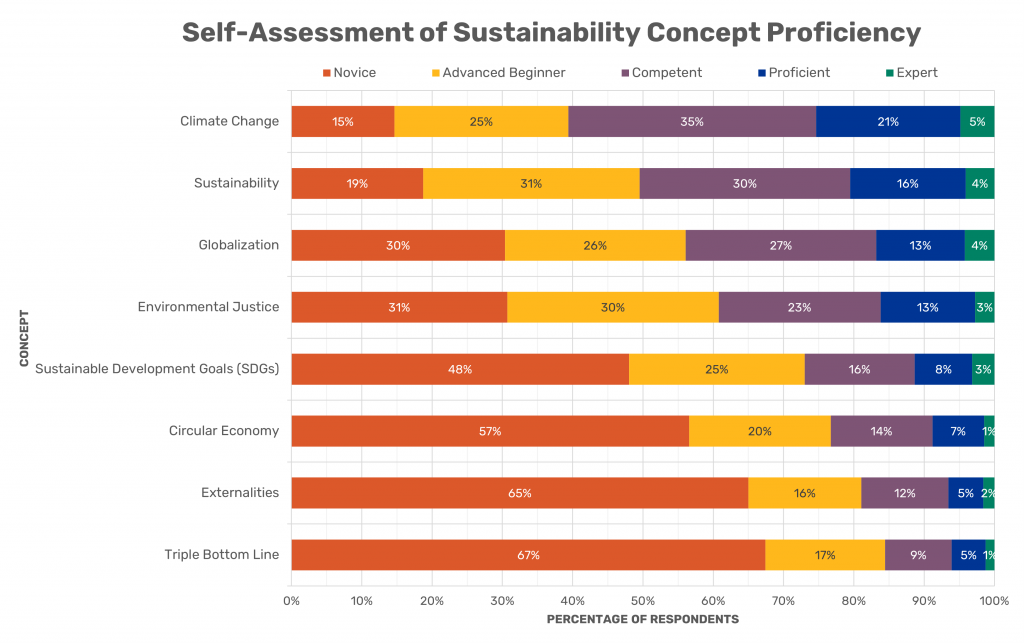
Notably, 85% of survey respondents reported having some understanding of Climate Change, with 81% having some confidence in their knowledge about Sustainability. 70% of respondents felt they had some grasp on the concept of Globalization. Proficiency across these 3 subjects did not vary between students and employees highlighting widespread familiarity with these critical issues.
Conversely, respondents reporting feeling least knowledgeable about the Triple Bottom Line and Externalities. Only 33% of respondents reported having more than basic understanding of the Triple Bottom Line, which considers social, environmental, and financial factors in decision-making. Similarly, the concept of Externalities, which deals with the side effects of economic activities on others, was grasped by 35% of those surveyed.
2023 Pitt Sustainability Culture Insights
The Culture section of the 2023 Pitt Sustainability Literacy & Culture survey included 12 questions querying respondents about their awareness of, engagement in, and perspectives of sustainability at Pitt. Participants answered questions about their individual contributions to advancing sustainability, perceptions of Pitt as a sustainability leader, and recognition of various sustainability-related organizations. Respondents also ranked pressing sustainability issues, engagement initiatives, and academic efforts. Results provide insights into the Pitt community’s perceptions of and priorities for University sustainability efforts.
Pitt’s Sustainability Leadership
In 2023, 47% of survey respondents agreed or strongly agreed that the University of Pittsburgh is a sustainability leader compared to other universities, with 40% selecting a “neutral” response. This response rate is slightly lower than in 2020, when 51% of respondents agreed that Pitt was a sustainability leader, but still notably higher than the 21% who agreed in the 2017 survey. Effectively conveying and celebrating Pitt’s sustainability endeavors clearly remains crucial for continued progress and campus community engagement.
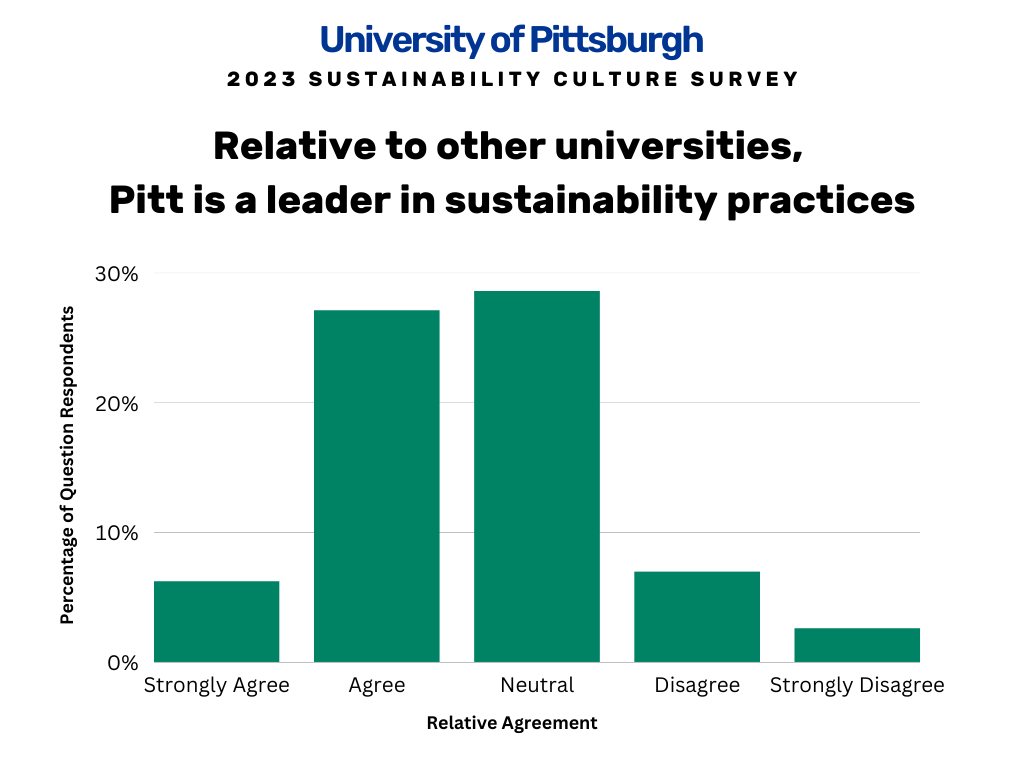
Commitment
In 2023, over 93% of respondents deemed Pitt’s commitment to sustainability as Moderately, Very, or Extremely Important This overwhelming support for prioritizing sustainability underscores the collective recognition of its significance in shaping Pitt’s present and future. 6.5% of participants indicated that sustainability integration was slightly important or not important at all, representing an opportunity for continued outreach and education about the value and benefits of sustainability as an integral part of Pitt’s vision and mission.
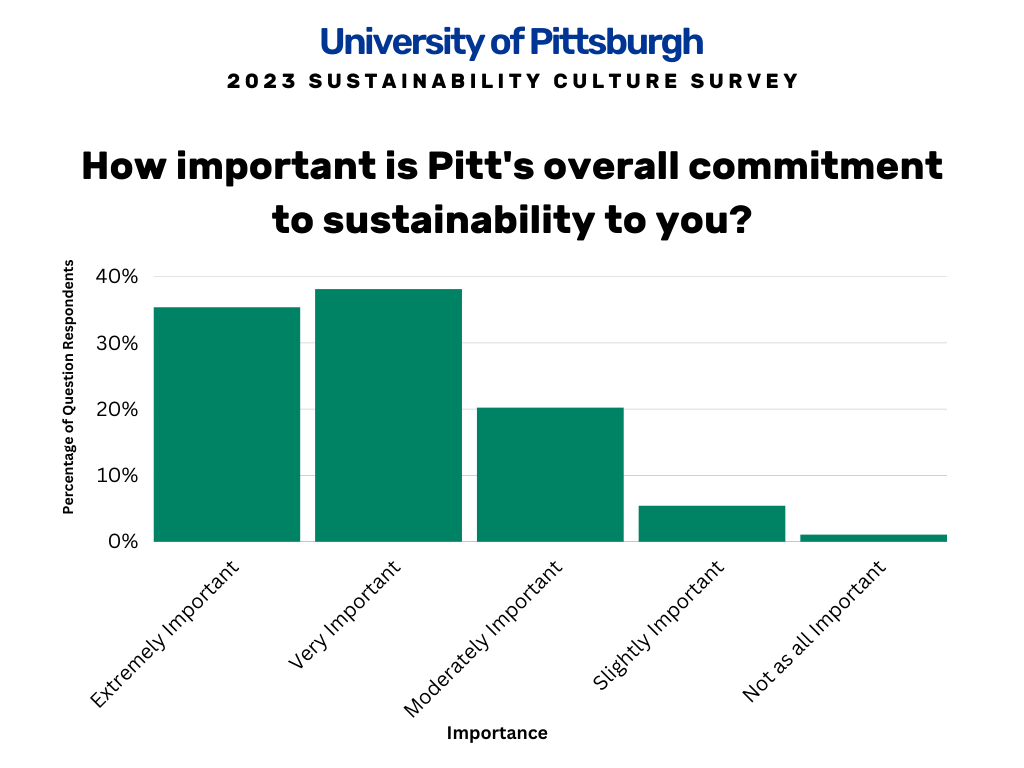
Prioritizing Sustainability Initiatives
2023 Survey respondents were asked to choose their top 3 priorities for pressing sustainability issues, engagement initiatives, and academic pursuits at Pitt.
Pressing Sustainability Issues at Pitt
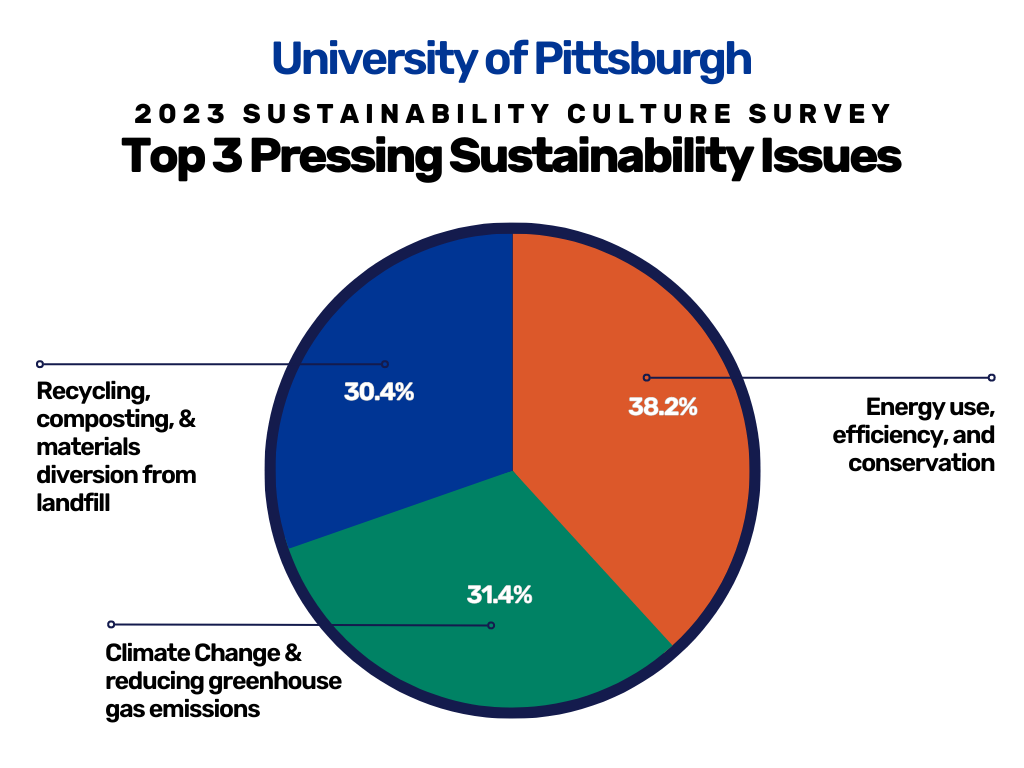
In prioritizing the top 3 pressing sustainability issues, 2023 survey respondents did so follows:
- Energy use, efficiency, and conversation
- Climate change & reducing greenhouse emissions
- Recycling, composting, & materials diversion from the landfill
However, when delving into specific stakeholder groups, a wider variety of concerns were identified, as summarized in the figure below.
- Undergraduate Students – “Climate change and reducing greenhouse gas emissions” tied with “Reducing dependence on fossil fuels” as the most significant concerns. “Recycling, composting, and materials diversion from landfill” came in third on the list.
- Graduate Students – “Recycling, composting, and materials diversion from landfill” was the most pressing issue, followed by “Climate change and reducing greenhouse gas emissions” and “Reducing dependence on fossil fuels” coming in third.
- Faculty – Ranked “Energy use, efficiency, and conservation” as their primary concern, followed by “Climate change and reducing greenhouse gas emissions,” and “Landscape and ecology” occupying the third spot.
- Staff – Top 3 concerns were “Energy use, efficiency, and conservation,” followed by “Health and well-being,” with “Recycling, composting, and materials diversion from landfill” ranked third.
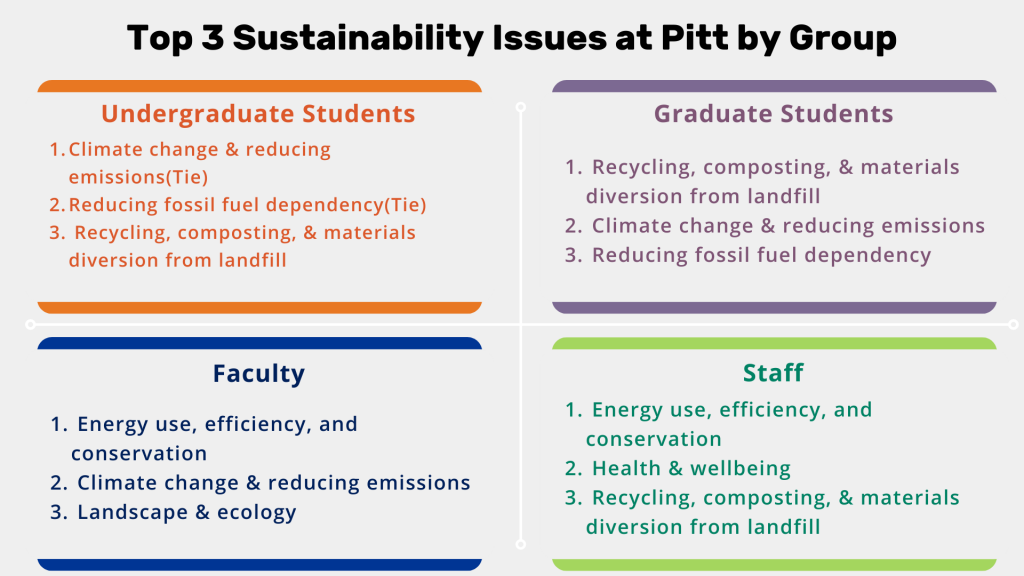
Prioritizing Pitt Sustainability Engagement Initiatives
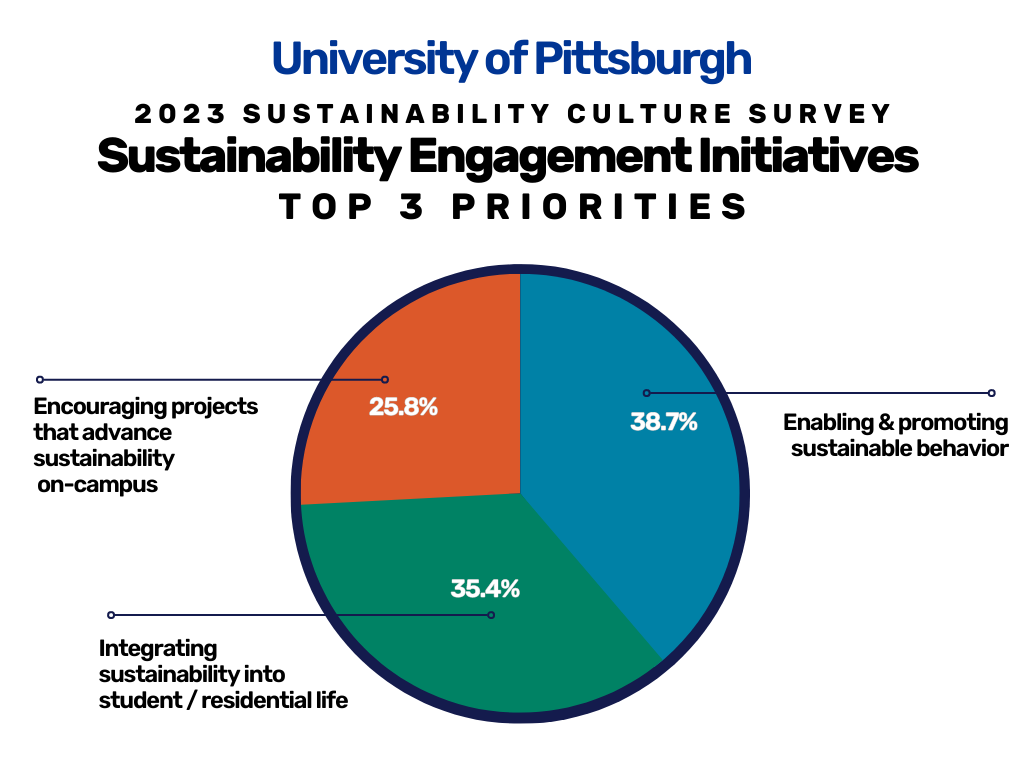
2023 survey respondents prioritized sustainability engagement initiatives as follows:
- Enabling and promoting sustainable behavior
- Integrating sustainability into student/residential life
- Encouraging projects that advance sustainability on campus
These 3 top choices aligned across all student and employee categories. For both undergraduate and graduate students, “Enabling and empowering climate action” came in just out of the Top 3.
Across all survey respondents, the least prioritized initiative was “Fostering advocacy on campus.”
Prioritizing Pitt Sustainability Academic Initiatives
In prioritizing where Pitt should focus its academic sustainability initiatives, respondents’ top priorities were:
- Addressing real-world problems in courses”
- Encouraging projects that advance sustainability in our communities
- Fostering multidisciplinary collaborations and learning
Top 2 choices remained consistent across all respondents
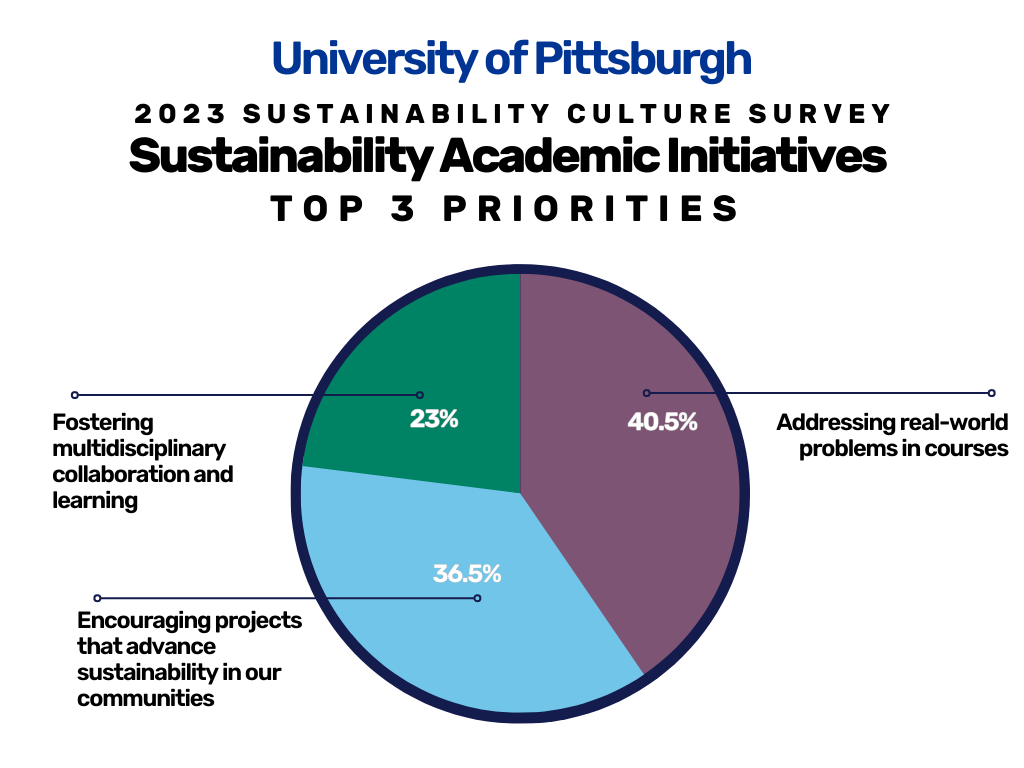
However, when delving into specific stakeholder groups, a wider variety of third place priorities were highlighted:
- Undergraduate Students = Requiring every student to take a sustainability-focused course
- Graduate Students = Incorporating sustainability into research
- Faculty = Fostering multidisciplinary collaboration and learning
- Staff = Connecting research with practice
Interestingly, “Integrating sustainability into all courses” received the least prioritization votes overall.
Contributions
The 2023 Pitt Sustainability Literacy & Culture Survey also asked respondents how they were personally willing to contribute to sustainability on campus, offering a glimpse into how individual efforts play a vital role in and collectively shape Pitt’s culture of sustainability.
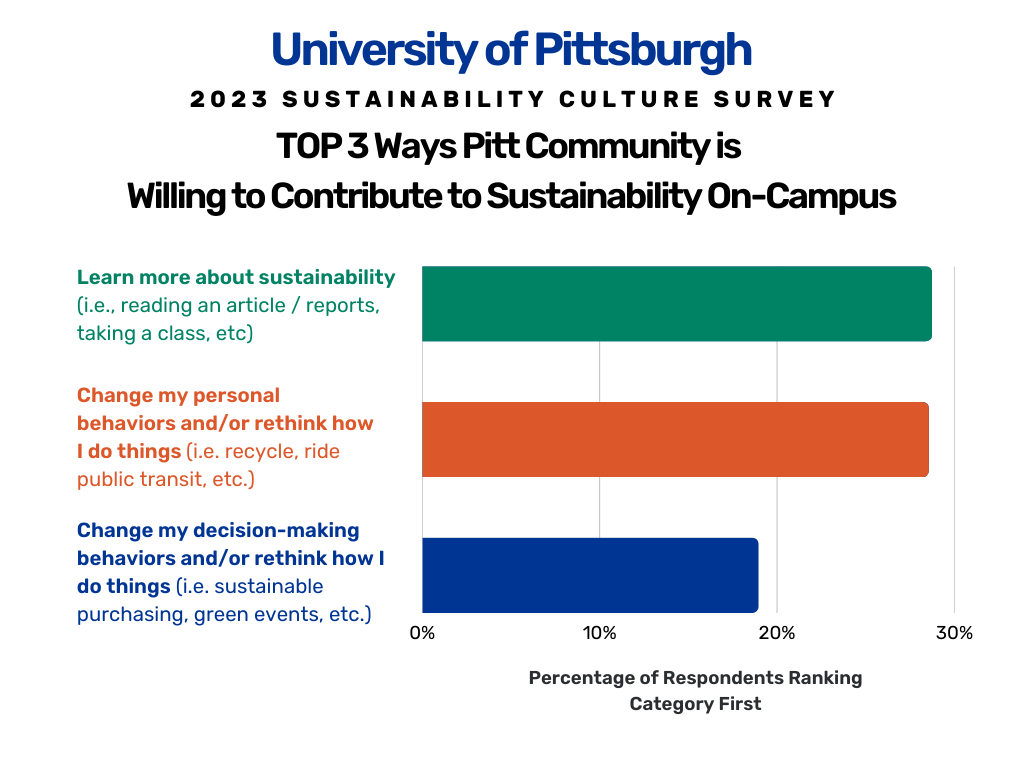
2023 survey responses indicate that individuals are most interested in and/or are already “Learning more about sustainability” or “Changing my personal behaviors and/or rethink how I do things.”
Top 3 choices are the same across students and employees.
Least popular choices were “Lead and organize an effort (i.e., help run existing initiatives and/or start a new program)” and to “Pay a premium (i.e., for a new sustainable product or service, mandatory fee to boost campus initiatives)”.
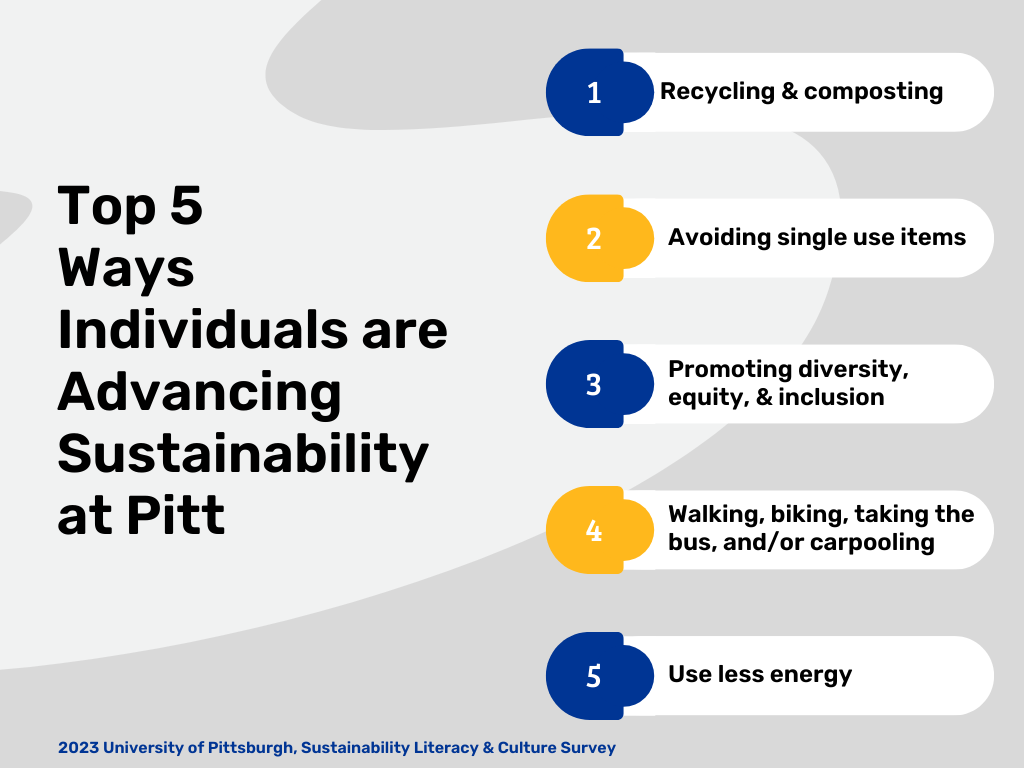
When selecting from a list of 17 actions and asked, “How are YOU individually advancing sustainability at Pitt?:”
- 68% of respondents actively engage in recycling and/or composting.
- 52% avoid single-use items
- 51% promote diversity, equity, and inclusion
- 47% utilize active and shared modes of transportation (including walking, biking, transit, and/or carpooling)
- 45% said they use less energy.
Respondent Ideas for Sustainability Initiatives & Activities
The 2023 Pitt Sustainability Literacy & Culture Survey asked participants for their ideas about sustainability initiatives and/or activities they like the University to pursue. Respondents provided a wide variety of thoughts and suggestions; the most common words used in these suggestions is provided in the word cloud below.
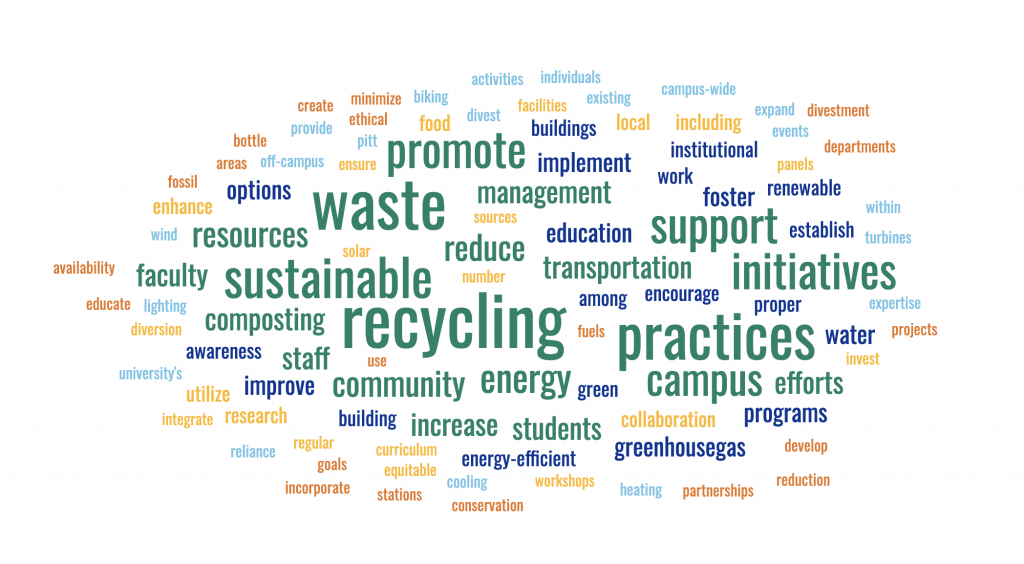
Prevalent suggestion categories are summarized below; all suggestions are under review and consideration by the Pitt Sustainability team.
- Campus-wide Education & Engagement
- Collaboration & Institutional Support
- Communications & Education
- Materials including Composting Expansion & Recycling
- Renewable Energy & Green Building
- Socially & Environmentally Responsible Investing
- Transportation & Access
2023 Results Summary
The 2023 Pitt Sustainability Literacy & Culture Survey provides an overview of sustainability literacy and culture at the University of Pittsburgh. Its results impact, inform, and help direct the Pitt Sustainability team‘s cross-campus work to help educate students, faculty, and staff on the broad scope of sustainability, along with Pitt’s sustainability efforts, commitments, and leadership in Pittsburgh, the United States, and around the world.
Regardless, the collective efforts of the Pitt community over the past demonstrate a strong and sustained commitment to balancing equity, environment, and economics so current and future generations can thrive at Pitt and around the world.
Opportunities abound to continue to engage every member of the Pitt community as an active contributor to the University’s culture of sustainability. A key need for broader communications about Pitt’s sustainability leadership, initiatives, and activities to all University stakeholders remains — and would provide more “top of mind” opportunities to assist every member of our community incorporate sustainability into their daily lives both on- and off-campus.
Future Surveys
Pitt’s Office of Sustainability will administer the next Sustainability Literacy & Culture Survey in 2026. Future efforts will include:
- Focused effort on increasing student and faculty response rates.
- An update of Literacy questions to reflect changing trends and knowledge.
- A decrease in the overall number of Literacy questions.
- Provision of answers to Literacy questions to respondents to help advance learning.
- Positional shift of survey order so that Literacy questions are after Culture questions.